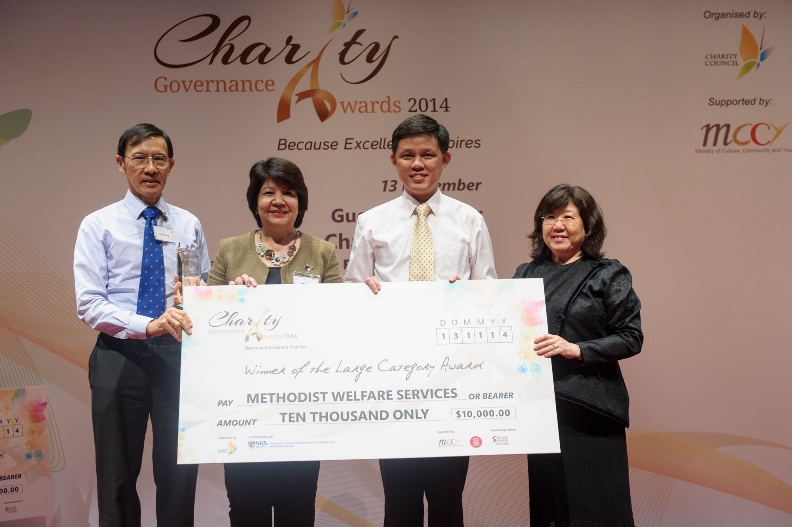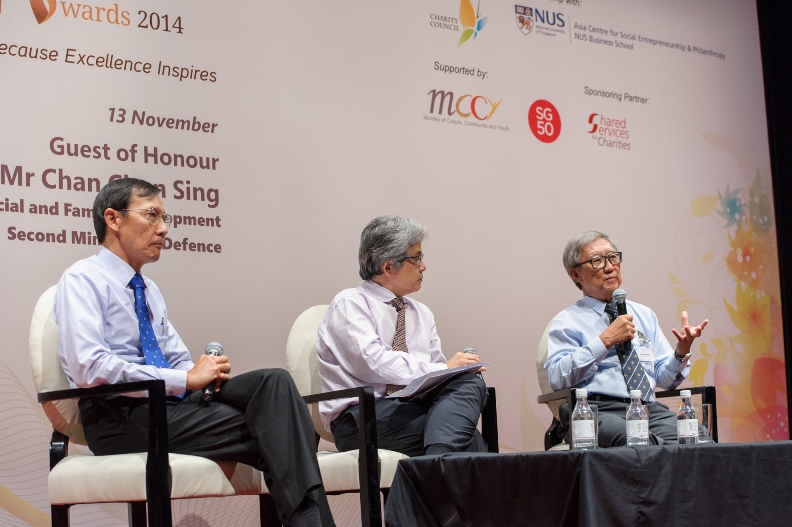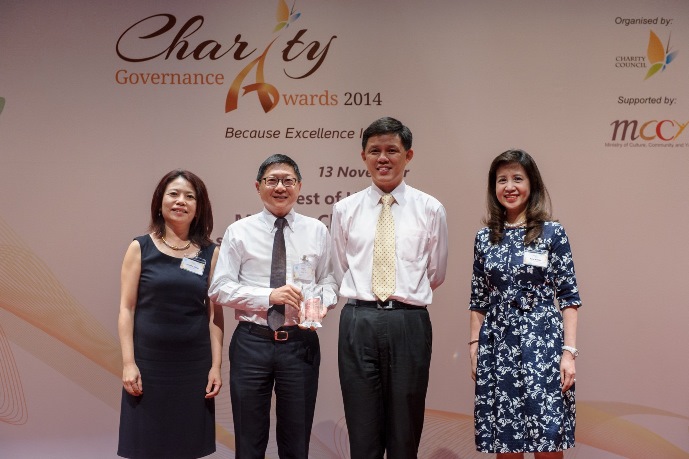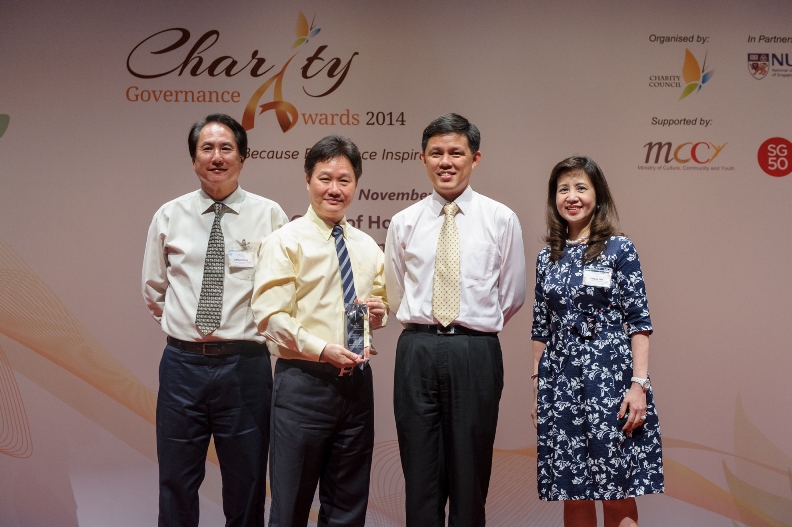The winners of the Charity Governance Awards (CGA) 2014 were recognised for their excellent governance practices at the Awards Ceremony held on 13 November 2014 at Joyden Hall, Bugis +. Handicap Welfare Association (HWA) and Methodist Welfare Services
(MWS) were conferred the top honours at this year’s Awards for the Medium Charities/IPCs and Larger Charities/IPCs categories respectively.
Special Commendation Awards were also given out to charities for excellence in particular areas of governance. Ren Ci Hospital was recognised for having Strong Improvement in Board Governance and Management. RVSP Singapore received the Special Commendation
Award for Strong Management Practices and SATA CommHealth was commended for having a strong Board Renewal and Strategic Repositioning in place.
The Awards was graced by Guest of Honour, Minister for Social and Family Development and Second Minister for Defence, Mr Chan Chun Sing. It attracted a turnout of approximately 250 guests from both charitable and non-charitable organisations.
An initiative of the Charity Council organised in partnership with the National University of Singapore's Asia Centre for Social Entrepreneurship and Philanthropy (ACSEP), the CGA aims to promote good governance in the charity sector by acknowledging
the excellent work of charities, while inspiring others to emulate their best practices.
CGA 2014 Winners
The CGA 2014 winner of each main category received a plaque and a cash prize of $10,000 to further their charitable causes, sponsored by Shared Services for Charities.
Please find the video of the 2 charities that were conferred this prestigious award and more details about each of the winners below. Enjoy!
Winner of Medium Charities/IPCs Category: Handicap Welfare Association

Overview and Key Principles
Handicaps Welfare Association is a self-funded agency that raises funds to cover its operating costs, thus, maintaining high public trust, donor confidence and ensuring transparency to our stakeholders are the guiding principles in our policies. We ensure that we comply with the Charity Council’s Code of Governance and maintain a sound corporate governance framework by continuously learning and adopting best industry practices and benchmarking our service quality against professional practices in the sector.
Strong Board Succession Planning
HWA’s Constitution mandates that only members with disabilities can serve in the Committee. Members who have experience in the social sector, in relevant corporate arenas and most importantly, have the passion to serve are encouraged to volunteer their
time as Board members. When a potential candidate is identified, he is mentored and encouraged to serve in various sub-committees within the Association to allow them to learn, understand and experience the workings of HWA as a Voluntary Welfare Organisation
(VWO).
All new Committee members are orientated to the mission and work of HWA, committee roles, responsibilities, protocols and procedures. Key board members who have ample experience in the Committee guide new members on HWA’s Constitution, financial management
and control procedures, operating procedures across all departments, disclosure and transparency guidelines and corporate governance. New committee members are also sent for relevant training courses.
Effort to Improve Board Effectiveness Despite Constraints Faced
As the Committee is running HWA on a voluntary basis, we foster a culture of transparency by clearly defining the ethical practices required of the Committee. The Committee is guided by a policy framework in its management of conflicts of interests. Duty
of disclosure, procedures to address conflicts of interests, corrective actions to breaches as well as periodic reviews ensure that HWA maintains the trust of the public.
Uniformity of Internal Control and Financial Management
The Association reviews its Standard Operating Procedures (SOP) as and when required to ensure updates and uniformity of its processes, procedures and documentation. This enables us to maintain our service quality standards and adhere to best practices
and compliance.
Our Financial SOPs provide a comprehensive guideline for administration processes as well as check and balance for our Management and Committee members. The check and balance of the Association’s operations is also strengthened by regular Internal Audits
and the annual External Audits.
Intricate Ground-level Feedback from Staff and Beneficiaries
A feedback and whistleblowing channel is also established between the Association’s Committee, the staff and its beneficiaries. Feedback from the management and staff is reflected to the board regularly via monthly staff meetings. Department heads also
work very closely with their staff to give prompt feedback to their performance and rectify any operational issues.
The Association is also very in-tuned with needs of the disabled community. We organize regular dialogue and feedback sessions with our beneficiaries and members to help us identify challenges they face and assist them accordingly. This also helps us
reflect and improve the quality of our services continually. Members’ informal feedback is also taken into consideration and reflected to the board via our monthly staff meetings.
Staff Development and Training
As a VWO and an Association that relies on public funding, staff are also required to uphold their personal integrity, conduct and professionalism in their work practices and processes.
Senior Management staff determines the training needs of their staff and discuss the needs for skills improvement in their respective areas of work through regular reviews. All staff are encouraged to undergo continuous training for personal and professional
development.
All professional staff are encouraged to attend development courses so as to keep their practicing certificates up-to-date and to keep updated on the latest developments or practices in their areas.
Winner of Large Charities/IPCs Category: Methodist Welfare Services

Overview and Key Principles
Methodist Welfare Services is a multi-service welfare agency, operating several centres providing the community with a variety of services. Our governance framework encompasses an independent Board which is accountable for the entire organisation, as
well as Governance Committees that oversee each of the respective centres. This framework has evolved in response to improving standards of governance, and to encourage committed volunteerism, and greater staff professionalism in the delivery of our
services to the community.
Our Board seeks to implement the highest standards of governance, with a clear focus on substance over form. These standards are established by the Board, and observed at all our centres throughout our organisation. The two key pillars that support our
entire approach to governance are: accountability and transparency. These two principles resonate throughout our governance policies and practice.
Engaging Partners And Volunteers
MWS works in partnership with Methodist churches and agencies, to operate our centres and deliver the much needed services to the community. This ensures close collaboration and accountability to our principal stakeholder, the Methodist community in Singapore.
As a result, most of our volunteers are from the Methodist community. This model ensures that our volunteers possess a high degree of commitment and ownership in their involvement. There is a high degree of interaction and collaboration between staff
and volunteers throughout our entire organisation.
We are also blessed with a wide and dependable base of donors and supporters, also largely drawn from the Methodist community. We seek to actively engage our donors and supporters, and ensure that they are kept informed of our programmes and activities.
A large proportion of our donors are also active volunteers, a manifestation of the sense of ownership and commitment that they possess. As a result, our donors generally have a good sense of the performance of our centres, and the respective contributions
which they make in the community.
In reality, our volunteers represent our key stakeholders and have a symbiotic working relationship with our centres, and indeed our entire organisation and its ministries. They participate actively in the leadership of our centres in the delivery of
services and provide constant and direct feedback in the process.
Board Succession Planning And Renewal
To ensure effective Board renewal, term limits are in place, and diligently observed. The Nominations Committee meets regularly to identify persons with the knowledge, experience and commitment required for the current and future needs of the organisation.
These persons are often drawn from our wide pool of volunteers who have demonstrated faithful service in one or more of our centres. This also ensures that our Board members are generally cognisant of the situation on the ground, and have a true heart
to serve the less fortunate in our society.
The Board, through the National Council of Social Service, also accepts nominations of interested administrative officers from the Public Service Division to join the board.
Constant Monitoring and Caliberation of Service Delivery
MWS runs multiple centres for beneficiaries ranging from children and youth to families and elderly.
We are subject to stringent evaluation and monitoring by different ministries and funding agencies such as MSF, NCSS and MOH. Data from this monitoring and regulatory process helps us to evaluate the standing of our Centres’ performances compared to other
VWOS.
Our Family Service Centres monitor output and outcomes through the Enhanced Programme Evaluation System. MWS’ management regularly reviews the effectiveness of the programmes and this is presented to our Centre Governance Committees.
A Board of Visitors appointed by MSF visits Christalite Methodist Home every month to ensure our residents’ medical, recreational and welfare needs are met. Our hostel for delinquent girls is also subjected to visits by a Board of Visitors. In regular
meetings with MSF, we are able to benchmark our services with other service providers. Our child care centre licence is subject to renewal every two years under the Child Care Centre Act. Licence is given only if we comply with standards set for the
childcare sector.
Financial Controls
The Finance Committee has established a clear set of financial policies and procedures. The implementation of these policies and procedures is closely monitored to ensure that adequate internal controls are in place. Annual budgets are scrutinised by
the governance committees of each centre, and the Finance Committee, and approved by the Board. We have an Audit Committee that works with both our statutory auditors and our internal auditors to ensure compliance with accounting standards and regulatory
requirements. Our annual report, incorporating the audited financial statements, is made available to members, volunteers, donors and stakeholders. The audited financial statements are also posted on our website and provide full disclosure for the
benefit of all stakeholders.
Talent Management
To find the right staff and retain good staff is a key priority for MWS. We invest significantly in the training and development of our staff, so that their career development matches their talent, skills, experience and aspirations to the organizations’
needs. This is intended to give our staff a better sense of their career path and development in MWS.
Staff development plans are identified based on the core competencies needed, and the appropriate knowledge, skills and attitudes to successfully carry out assigned duties and be prepared for changes in the social service sector. For eg. we have taken
a proactive approach in ensuring that staff satisfy the Code of Professional Practice for staff in family service centres and ensuring that staff in our nursing home meet the Enhanced Nursing Home standards. This is done by consciously mapping the
current staff competencies against the required and future needs. A training roadmap is then developed and implemented.
To develop our leaders, MWS has launched a Coaching Programme in collaboration with the CNPL (Centre for Non-Profit Leadership) and the International Federation of Coaches. Each Head of Centre is matched to a personal coach for individual coaching. High
potential staff are also sent for leadership development courses, such as the Non-Profit Management Programme for the 21st Centuryrun by the Lee Kuan Yew School of Public Policy.
Sharing by Winners of CGA 2014

After the awards presentation ceremony, the CGA 2014 winners, Handicap Welfare Association and Methodist Welfare Services, were invited onto the stage as panellists to have a conversation with the audience. Moderated by Associate Professor Mak Yuen Teen,
both Chairmen of the respective charities shared on the challenges they had faced and how they overcome them to achieve good governance practices. They also willingly and graciously shared on their best practices for other charities to take reference
from.
Special Commendation Awards
Special Commendation Awards are given out to charities for excellence in particular areas of governance. Each winner was presented with a plaque.
Special Commendation Award For Strong Improvement in Board Governance and Management: Ren Ci Hospital

Board Renewal and Induction
In the last two years, Ren Ci reviewed and refined its Board renewal and induction process. Ren Ci introduced a skills matrix to guide the Board in the selection of Board members. The matrix reflects an aim of diversity and the needs of the organisation;
for example, the Board must comprise professionals, businessmen and health/community leaders in equal parts. Knowledge gaps on the Board are identified through the skills matrix which helps in the selection of relevant persons to join the Board.
To ensure that new Board members are positioned to contribute, a structured induction programme has been introduced in addition to an induction kit. New members are introduced to the intermediate and long-term care (ILTC) and charity sectors. They hear
from healthcare experts and staff, and interact with Ren Ci’s beneficiaries. They gain a better understanding of the challenges faced, needs and wishes of our beneficiaries. The success of the structured induction programme is reflected in the lively
exchange and engagement of these new Board members with the rest of the Board and stakeholders at meetings, visits and events.
Persistence in Improving Board Governance
Ren Ci has developed many policies and procedures, including a Code of Conduct and Conflict of Interest policy to guide the actions of all staff and volunteers. These policies are audited and reviewed regularly by the Board. Presently, the organisation
is embarking on a risk identification exercise and developing a risk framework as the next step towards improved governance.
An annual Board evaluation looks into the relevance and performance of the Board including its sub-committees. Areas identified for improvement are worked on and reported at the following Board meetings.
Strong chairman with a hands-on approach in running the organization
Our Board Chairman and CEO work closely with government agencies, and support the nation’s demand by expanding capacity and services. In addition, the model of care is important to a changing profile of beneficiaries. Our Chairman and board members have
visited both local and overseas healthcare institutions with management, with the aim of adapting best practices. He receives quarterly updates of feedback received, and has for example, supported a change in food vendor as a result. He drops in regularly
to visit patients, residents and staff and interacts with volunteers, donors and staff during appreciation sessions and at festive occasions.
Strong board who works well together
Besides complementing one another on skills and networks as needed by the organisation, efforts made for smooth transition at Board renewal include appointing retiring Board members as advisers and having sub-committee members join the Board.
Coming together at Board retreats to reaffirm values, refresh the mission and vision also aligns the Board. Other than bonding socially, discussions forged a focus of activities in line with the refreshed direction. For example, Board’s involvement in
conceptualising the recent Charity Gala Dinner went beyond fundraising to publicise the hope our beneficiaries hold to return and contribute to the community.
Successful restructuring from a society to a Company Limited by Guarantee (CLG)
In 2010, we converted from a society to a Company Limited by Guarantee to fulfil more stringent financial and audit requirements such as the Financial Reporting Standards (FRS), which is in line with Ren Ci’s commitment to demonstrate a higher level of
accountability and corporate governance. We also continued to publish a corporate governance statement in our annual report, seeking ways to enhance transparency year on year in the financial statement and annual report.
During the change, we converted our society’s constitution to a Memorandum & Articles of Association which prescribes Board composition and voting rights.
Special Commendation Award for Strong Management Practices: RSVP Singapore The Organisation of Senior Volunteers

Strong Management Practices
RSVP has strong management practices. Management actively tracks the performance of the organisation through a robust benchmarking system.
The board and management practise open communication styles that provide a supportive and inclusive working environment for the staff as well as volunteers.
There is also a clear reporting structure. Standard operating procedures are written to facilitate better operational efficiency.
Well-managed Volunteer System
Volunteers play an indispensable role in the success of RSVP Singapore. The screening and review process of prospective members includes a face-to-face interview. During the interview, RSVP’s mission and purpose are explained to them to ensure understanding.
Prospective members are also made to understand that commitment to volunteer duty is a key component of membership and training is required to ensure quality service is given to the beneficiaries of our programmes.
Personal particulars, records of duty and training of volunteers are kept in an integrated Volunteer Management System. The system allows reports to be extracted. These reports are used for planning for programme improvement and new initiatives. They
are also the records on which reimbursement of out of- pocket expenses are made electronically.
Members are kept abreast of the happenings in our organizations through informal gatherings, activity circles and interaction with staff. The volunteer lounge is opened at all times. An electronic monthly newsletter and short electronic news flashes also
help to maintain outreach to members. Periodic tea sessions chaired by the RSVP President are organized for a more personalized communication platform with members. Board members are also present to help with queries and request of information made
by members.
Special Commendation Award for Board Renewal and Strategic Repositioning: SATA CommHealth

Board Renewal, Induction and Evaluation
The SATA CommHealth Board is guided by a set of corporate governance guidelines, based on best practices in the corporate and voluntary sectors, including those recommended by the Code of Governance for Charities and Institutions of a Public Character
(IPCs). The Governance and Nominating Committee oversees the guidelines for SATA CommHealth. New members inducted to the Board undergo thorough scrutiny and are sourced through independent methods (Board Match) and from board recommendations. After
which, they will undergo a formal induction programme spanning over six months.
Board Renewal and Succession Planning
The directors, as a group, have core competencies in areas such as accounting and finance, management, law, medicine, strategic planning, technology, social enterprise and community-related experience and they bring on board a degree of diversity of viewpoints,
expertise and experiences. Our succession plan and Board renewal are aligned to our mission and addresses gaps in expertise and competencies through sourcing for the appropriate candidates. Board members have a term limit of four terms of two years
per term with the exception of the Chairman.
Board Evaluation is also used to actively examine board performance, in order to find ways to improve its effectiveness as well as for succession planning. This evaluation process provides Board members the opportunity to engage in self-reflection and
provide the necessary feedback for improvements. The Board also guides talent grooming within the Board by having its members chair a Board committee.
Robust Benchmarking Practices
We constantly benchmark our organisation against other established charities with similar services to rate our programme effectiveness and operational efficiency. The internal and external benchmarks coupled with the use of accreditation programmes such
as bizSafe 3, ISO 9001:2008 to further refine processes and improve operational efficiency.
SATA CommHealth also ensures that its finite resources for the operations and programmes are well managed. Processes are in place to ensure that SATA CommHealth complies with all applicable laws, rules and regulations; and that there is an appropriate
code of conduct which upholds the core values of SATA CommHealth and processes to ensure compliance with the code.
Strategic Review and Repositioning
As part of its strategic management and positioning, SATA CommHealth continually reviews its business focus and strategies. A comprehensive strategic review by PriceWaterhouseCoopers of our model of charitable work, social enterprise and our services
to better address the changing healthcare needs of Singapore was carried out in 2012. Following this review, the board approved three new areas of focus that was seriously explored in addressing the needs of the ageing population: Homecare, Family
Medicine Services and, in the longer term, Nursing Homes. Our Homecare services was launched in 2012 and the Family Medicine Services are about to be launched at Bedok. We have also engaged Bain and Company to study the advancement of our business
base in 2014.
Coupled with our continuous partnership and involvement with regulatory bodies and likeminded community partners, we have always been aligning and adjusting our market focus to tap on new areas and offer new services. As an example, one such area of innovation
is starting an e-shop to complement our home care services and to provide our clientele with homecare supplies using an e-commerce platform.
